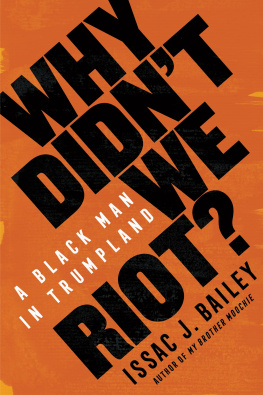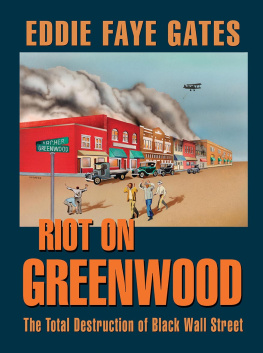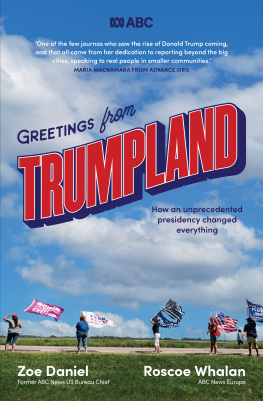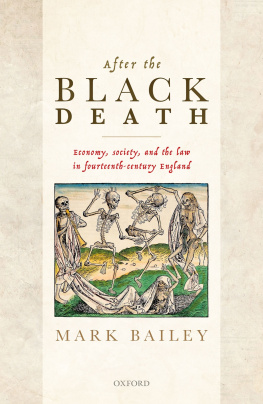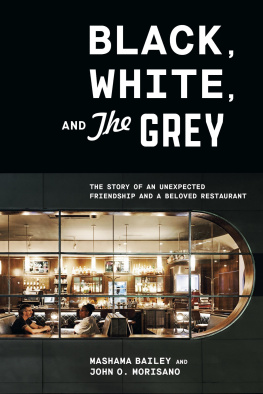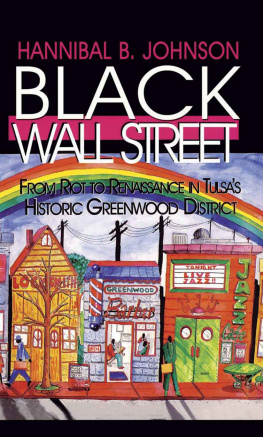Issac J. Bailey - Why didnt we riot: A Black Man in Trumpland
Here you can read online Issac J. Bailey - Why didnt we riot: A Black Man in Trumpland full text of the book (entire story) in english for free. Download pdf and epub, get meaning, cover and reviews about this ebook. year: 2020, publisher: Other Press, genre: Politics. Description of the work, (preface) as well as reviews are available. Best literature library LitArk.com created for fans of good reading and offers a wide selection of genres:
Romance novel
Science fiction
Adventure
Detective
Science
History
Home and family
Prose
Art
Politics
Computer
Non-fiction
Religion
Business
Children
Humor
Choose a favorite category and find really read worthwhile books. Enjoy immersion in the world of imagination, feel the emotions of the characters or learn something new for yourself, make an fascinating discovery.
- Book:Why didnt we riot: A Black Man in Trumpland
- Author:
- Publisher:Other Press
- Genre:
- Year:2020
- Rating:4 / 5
- Favourites:Add to favourites
- Your mark:
- 80
- 1
- 2
- 3
- 4
- 5
Why didnt we riot: A Black Man in Trumpland: summary, description and annotation
We offer to read an annotation, description, summary or preface (depends on what the author of the book "Why didnt we riot: A Black Man in Trumpland" wrote himself). If you haven't found the necessary information about the book — write in the comments, we will try to find it.
Issac J. Bailey: author's other books
Who wrote Why didnt we riot: A Black Man in Trumpland? Find out the surname, the name of the author of the book and a list of all author's works by series.
Why didnt we riot: A Black Man in Trumpland — read online for free the complete book (whole text) full work
Below is the text of the book, divided by pages. System saving the place of the last page read, allows you to conveniently read the book "Why didnt we riot: A Black Man in Trumpland" online for free, without having to search again every time where you left off. Put a bookmark, and you can go to the page where you finished reading at any time.
Font size:
Interval:
Bookmark:
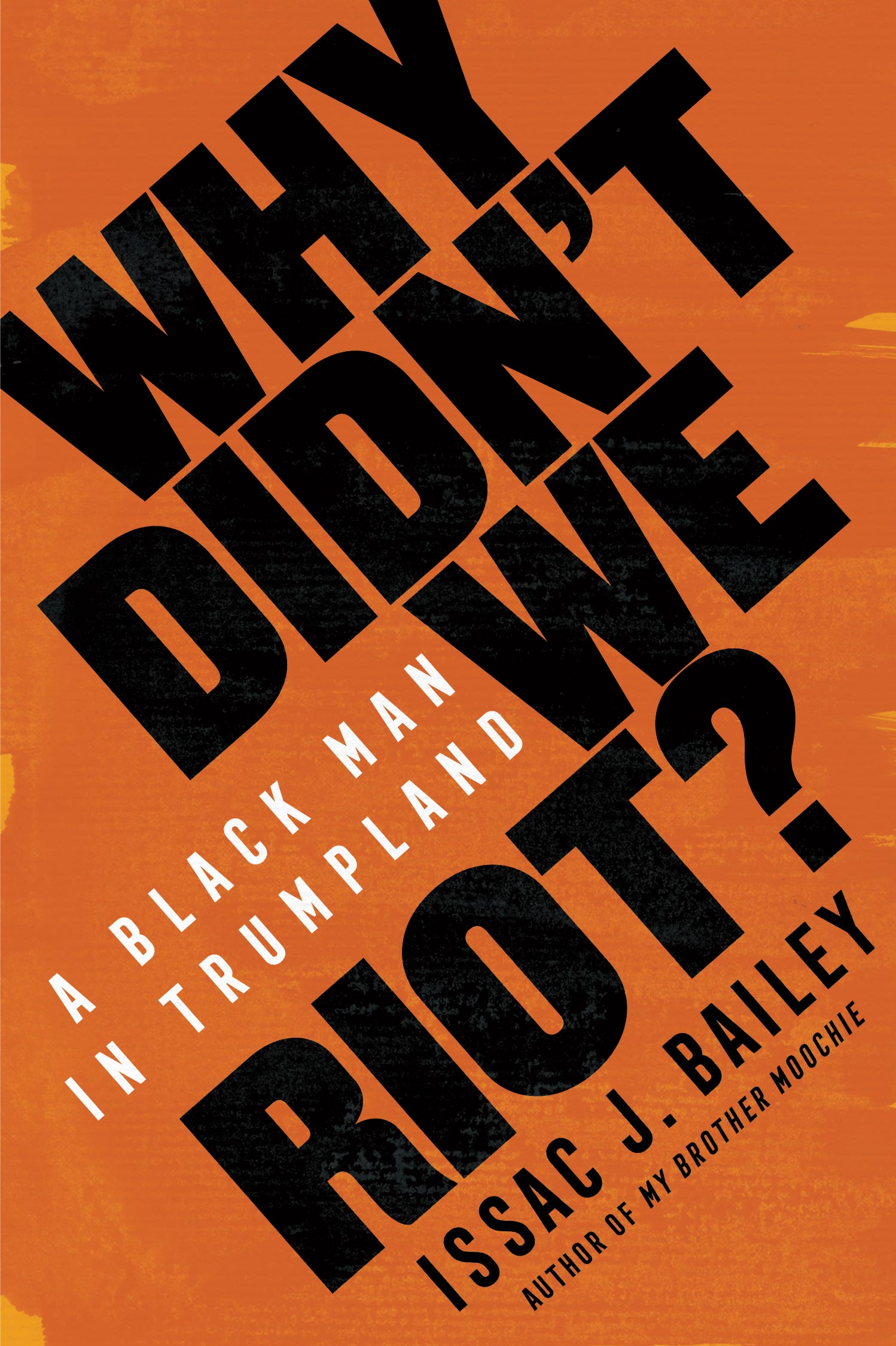
ALSO BY ISSAC J. BAILEY
My Brother Moochie: Regaining Dignity in the Midst of Crime, Poverty, and Racism in the American South
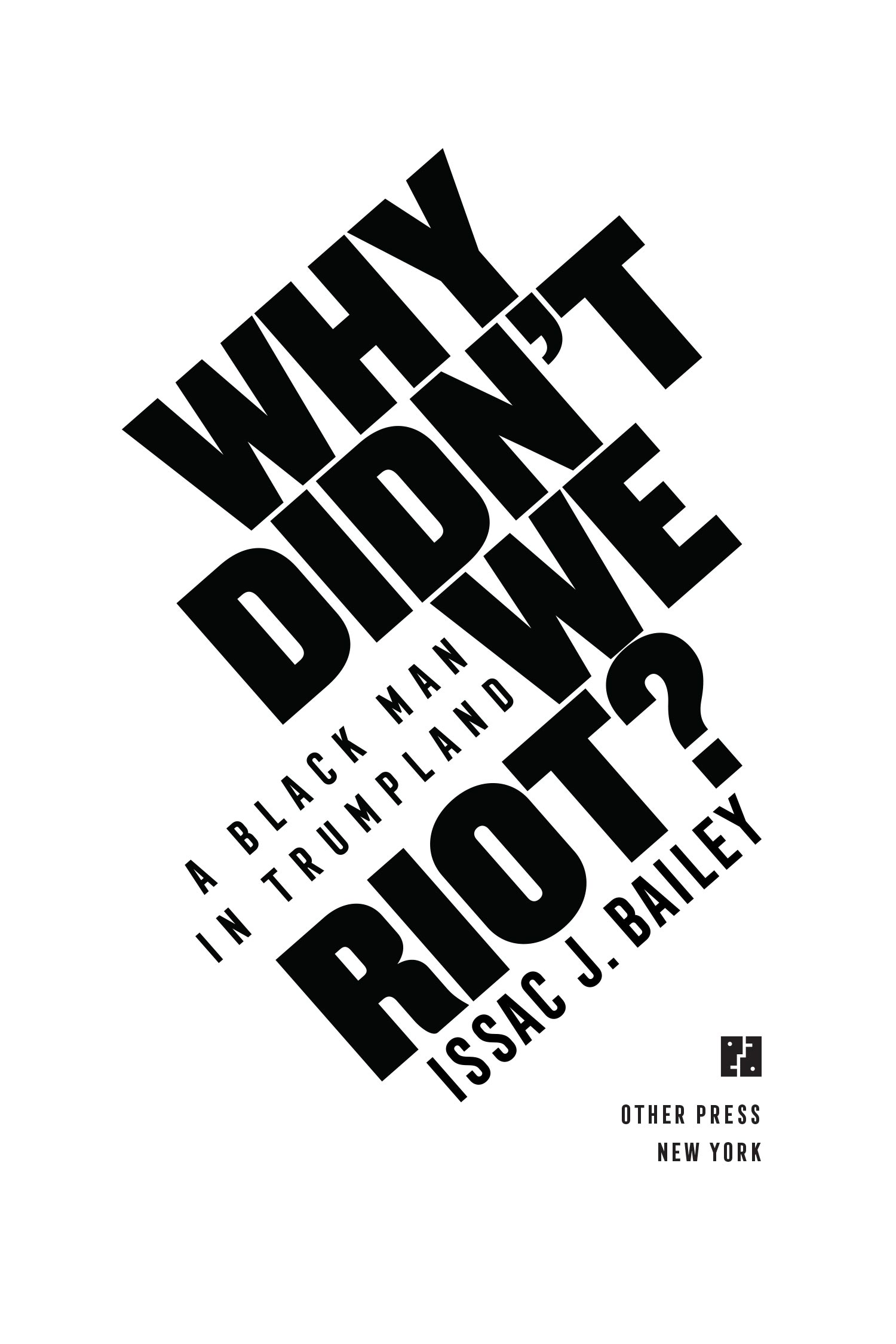
Copyright 2020 Issac J. Bailey
Production editor: Yvonne E. Crdenas
Text designer: Julie Fry
All rights reserved. No part of this publication may be reproduced or transmitted in any form or by any means, electronic or mechanical, including photocopying, recording, or by any information storage and retrieval system, without written permission from Other Press LLC, except in the case of brief quotations in reviews for inclusion in a magazine, newspaper, or broadcast. For information write to Other Press LLC, 267 Fifth Avenue, 6th Floor, New York, NY 10016. Or visit our Web site: www.otherpress.com
The Library of Congress has cataloged the printed edition as follows:
Names: Bailey, Issac J., author.
Title: Why didnt we riot? : A black man in Trumpland / Issac J. Bailey.
Description: New York : Other Press, [2020]
Identifiers: LCCN 2020008891 (print) | LCCN 2020008892 (ebook) | ISBN 9781635420289 (hardcover) | ISBN 9781635420296 (ebook)
Subjects: LCSH : Racism United States History 21st century. | United States Race relations History 21st century. | African Americans Social conditions 21st century. | Discrimination in law enforcement United States. | Police brutality United States. | African Americans Crimes against. | African Americans in mass media. | African Americans Politics and government 21st century. | Trump, Donald, 1946
Classification: LCC E 185.615. B 263 2020 (print) | LCC E 185.615 (ebook) | DDC 305.800973 dc23
LC record available at https://lccn.loc.gov/2020008891
LC ebook record available at https://lccn.loc.gov/2020008892
Ebook ISBN9781635420296
a_prh_5.6.0_c0_r0
In a scene from the 1992 Denzel Washingtondirected movie Antwone Fisher, the central character shows up on the doorstep of his childhood foster home and is greeted by a woman who had spent years sexually abusing him when he was young.
Come here, baby, she greets him.
Dont touch me, he snaps.
He is no longer a little boy, but rather a man matured by the U.S. Navy.
Id like to speak to Mrs. Tate, he tells his tormentor, referring to the foster mother who had spent years treating him like a disposable diaper and beat me to dust until he ran away at the age of fourteen and got into trouble before finding his way into the military.
Fisher was placed with the Tates, a deeply religious couple, when he was two years old. His father had been killed before he was born. His teenage mother gave birth to him while she was in jail.
Oh nigga, hug my neck! Mrs. Tate says with a smile while trying to embrace him, as though she were a long-lost friend, not an evil that had nearly destroyed Fisher.
He doesnt hug her neck or any part of her, doesnt smile, doesnt pretend to want anything to do with her. He doesnt need an apology she doesnt think to offer. He neither wants nor needs her approval. The scars are still too fresh, too deep, all those years later.
You couldnt destroy me, he says, defiance dripping from every syllable he speaks. Im still standing. Im still strong! And I always will be.
Im Antwone Fisher to white Americas Mrs. Tate. I dont want it to be that way. But I dont know how to be otherwise. The scars are too deep, too fresh. I knew we were in trouble when I couldnt find a way to not be angry, because I had never been angry before, not in a sustained way. If a black man like me was having trouble corralling his anger, I knew it meant that anger among black people had to have risen to biblical proportions and could ignite given the right spark. I just didnt know that spark would be eight minutes and forty-six seconds of a video of a white cop slowly, defiantly snuffing the life out of a black man on the concrete in broad daylight in front of numerous onlookers.
As I type these words in June 2020, I get that the Confederate flag came down after the massacre in Charleston. I appreciate that cities, counties, and police departments have begun rethinking their use-of-force policies, that police unions are being pressured to allow reform or get out of the way. Symbols of white supremacy are under attack monuments, memorials, Gone with the Wind in a way I had never seen in my lifetime. Demonstrators throughout the world called George Floyds name in solidarity with black Americans. New York repealed a law that had kept police discipline records private. Lady Antebellum became Lady A.
Protesters chopped off the head of a monument built in honor of Robert E. Lee, the man who led the Confederate army. They threw a statue of Christopher Columbus into a lake. Clemson University trustees voted to remove the name of slavery champion John C. Calhoun from its Honors College. The mayor of Boston declared racism a health emergency and dedicated $3 million in funds to deal with it. NASCAR yes, NASCAR! banned the Confederate flag from all its properties and events. Even The Bachelor has named its first black lead.
Still, Im jaded. Thats why Im having a hard time processing how to feel after years of banging my head against a brick wall and finally seeing cracks emerge. Im not yet convinced white people are willing to do what it would take to enact the changes we need, even after the most sustained and widespread protests of my lifetime. I fully expect that even after all weve seen, all the harm Trump has done on the issue of race, and so many other things, that he is more likely to garner 60 percent of the white vote in November than 50 percent. I fully expect that he will win the white vote at every economic level the way he did in 2016. I fully expect that if Trump finds a way to get a second term, it will be because white America decided that white supremacy and racism arent deal breakers even in 2020.
The immediate changes made in the wake of the Floyd protests were positive. But they were low-hanging fruit. White supremacy and anti-black racism have to be pulled up by the roots in order for long-lasting reform to take hold. If that doesnt happen, if there is no real racial reckoning, history will repeat itself. The past has made that clear. When I was a student at Davidson College in North Carolina in the early 1990s, I sat in my dorm watching on CNN scenes from the L.A. riots after the Rodney King verdict. Not too long after I finished teaching a couple of journalism courses at Davidson during the spring 2020 semester, Floyd was murdered by police in Minnesota.
White supremacy meant a race-based chattel slavery would be further entrenched after black people helped white colonists defeat the British. It meant Reconstruction, during which black people made significant steps forward even though they were only recently freed from slavery, was followed by Redemption and the rise of the Ku Klux Klan and a century of lynchings. Black excellence along Black Wall Street in Tulsa was met by mobs of white vigilantes and their friends in the military and police who murdered hundreds of black people and left thousands homeless. Black veterans were treated worse than German POWs during World War II. White supremacy convinced white parents and school officials to be defiant in the face of a 1954 Supreme Court that supposedly killed Jim Crow then convinced white voters to follow the era of the nations first black president with the election of a man whose rise to political heights was powered by the open use of bigotry and racism.
Font size:
Interval:
Bookmark:
Similar books «Why didnt we riot: A Black Man in Trumpland»
Look at similar books to Why didnt we riot: A Black Man in Trumpland. We have selected literature similar in name and meaning in the hope of providing readers with more options to find new, interesting, not yet read works.
Discussion, reviews of the book Why didnt we riot: A Black Man in Trumpland and just readers' own opinions. Leave your comments, write what you think about the work, its meaning or the main characters. Specify what exactly you liked and what you didn't like, and why you think so.

